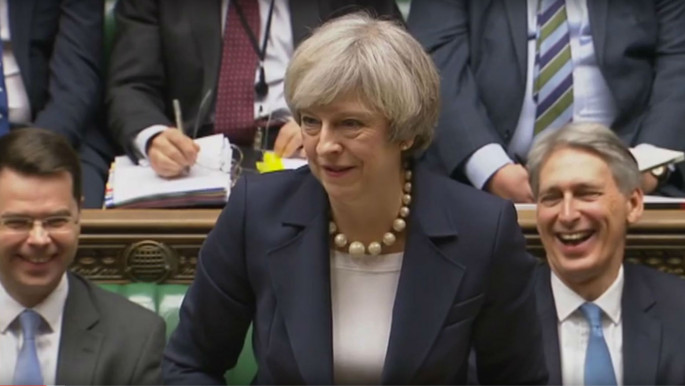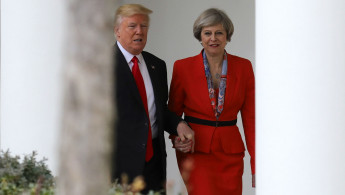Theresa May calls Trump's Muslim ban 'divisive and wrong'
British Prime Minister Theresa May has called US President Donald Trump's temporary immigration ban as "divisive and wrong," five days after she initially refused to condemn the move.
"On the policy that president Trump has introduced, this government is clear that that policy is wrong," May told parliament on Wednesday after being pressed by opposition Labour leader Jeremy Corbyn.
"We believe it is divisive and wrong," she said, speaking to MPs for the first time since the travel ban came into force on Friday – the same day she met Trump at the White House.
Trump's executive order bars refugee arrivals for at least 120 days and suspends visas from seven Muslim-majority countries – Iran, Iraq, Libya, Somalia, Sudan, Syria and Yemen – for 90 days.
But May insists she had no advance notice of Trump's plans.
"If he (Corbyn) is asking me whether I had advance notice of the ban on refugees, the answer is no. If he is asking me if I had advance notice that the executive order could affect British citizens, the answer is no.
 |
|
|
May was pressed by opposition Labour |
"If he is asking if I had advance notice of the travel restrictions, the answer is we all did, because president Trump said he was going to do this in his election campaign."
The ban sparked mass protests in Britain and around the world and was swiftly condemned by the United Nations and countries including Germany and France.
May initially failed to condemn the measure, saying the US was responsible for its own refugee policy. She then issued a statement saying she did "not agree" with it.
During May's visit, Trump accepted an invitation to make a state visit to Britain later this year, prompting a petition, which as of Wednesday has garnered 1.8 million signatures, demanding that Britain rescind the invitation.
British parliamentarians will hold a debate on Trump's state visit on February 20, as well as a second debate on another petition calling for the state visit to go ahead, which has gained over 100,000 signatures.
This follows the procedures of the British government's petition system, which requires that topics to be considered for parliamentary debate if more than 100,000 signatures are received.





 Follow the Middle East's top stories in English at The New Arab on Google News
Follow the Middle East's top stories in English at The New Arab on Google News
![The UAE is widely suspected of arming the RSF militia [Getty]](/sites/default/files/styles/image_330x185/public/2024-11/GettyImages-472529908.jpg?h=69f2b9d0&itok=Yauw3YTG)
![Netanyahu furiously denounced the ICC [Getty]](/sites/default/files/styles/image_330x185/public/2024-11/GettyImages-2169352575.jpg?h=199d8c1f&itok=-vRiruf5)
![Both Hamas and the Palestinian Authority welcomed the ICC arrest warrants [Getty]](/sites/default/files/styles/image_330x185/public/2024-11/GettyImages-2178351173.jpg?h=199d8c1f&itok=TV858iVg)